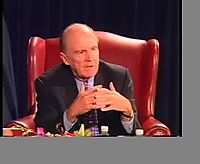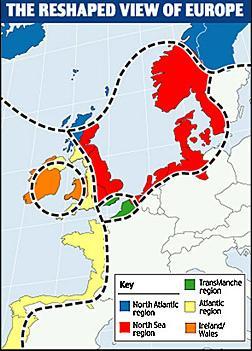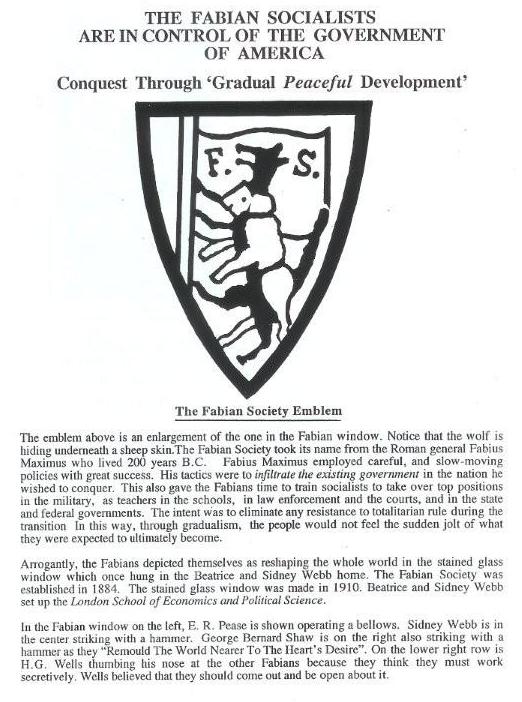|
A couple of
days ago I had
a fit about several programs
on C-Span that I’d
watched in which all of the people spoke in zombie talk and
what they were talking about were problems that occurred as
a result of non-sequitur solutions to problems which created
bigger problems that they were attempting to solve with even
more illogical, non-sequitur solutions.
Everybody in the program - from the Mayor of a
Columbian city, to the USTR, Susan Schwab, to the members of
Congress accompanying her on the trade mission spoke in what
I've come to call Zombie Talk. Zombie talk is
imprecise labels used instead of the precise term applicable
to the immediate situation. A simple example is the
use of the word furniture rather than the word chair when
you are talking about a chair - and assume that you can't
see the object so you have to guess the object. In
your mind, after listening to a discussion of furniture, you
pick up the clues and do a translation to the word 'chair'
and from that point, the discussion makes sense. This
example is simple because it's both physical and the object
choices are limited.
Just looking at the language,
'furniture' is a set name. Chair, couch, table all
belong to the set 'furniture'. By the description of
an individual item in the set, you can translate the
imprecise word 'furniture' to the precise word 'chair'.
The more different kinds of objects that are included in
the set, the less precise the set name has to be. For
example, consider the people involved in a school: you
have the students, teachers, principal, janitor,
secretaries, guidance counselor, etc. So what would
you use as a set name for all those individuals?
How about human resources? It is descriptive of the
set of individuals as a collective label. But
when you are talking about an individual teacher or a
student, the label human resource makes no sense.
Set labels make sense in some contexts. When you
call a moving company, you don't want to list every item you
want moved so you say, I want my furniture moved. For
most people, that is as complex as the use of sets and set
labels gets. However, in the world of computers and
systems design, their world revolves around sets.
Systems analysts define everything as being a member of a
set. Individual objects that do not fit a set
classification are not desirable because they require
special handling which reduces efficiency so what Systems
Analysts tend to do is to drive for uniformity for
efficiency of information handling.
Uniformity for the purpose of quality control in a
manufacturing process is highly desirable. You do want
all products coming off an assembly line to be identical.
But as a general rule, uniformity is highly undesirable
because 'one size does not fit all'. It would be
absurd if a societal decision was made to produce all
dresses in a size 12 because that is the average size.
It would be efficient from a Systems point of view, but it
wouldn't work in the real world where some women wear an 18
and others wear a 2. Using simple examples, it's
easy to see that efficiency for some purposes creates
insoluble problems in other areas.
National Information Infrastructure
As I described in a
commentary the other day, one of the
Clinton-Gore initiatives was to redesign government to be
more efficient. A committee was empowered to look at
the government computer systems and re-engineer them - and
as a consequence, to change the way government functions all
for the sake of efficiency of information processing.
When you redesign processes from the top, it drives changes
all the way down the information chain. As the
government standardizes definitions for uniformity for their
computer systems, they drive standardization and uniformity
to the states, counties and cities - and ultimately down to
the people.
The standardization (aka
harmonization) is
packaged into programs like 'No
Child Left Behind (NCLB)' which was more about the
national computer system for management of the education
system (i.e. performance metrics) than it was about educating children. Because
automating processes at the federal government level is a
huge undertaking, the plans for automation are initially
packaged as 'Best
Practices' that ultimately will be coded into law
as mandates under names like NCLB.
While the package of NCLB did
have some good things in it - for a few school districts,
the majority opinion of it at the classroom level is that it
has been a dismal failure - and the reason is obvious when
you understand that it was marketed as one thing -
improvements for education - when it fact it was something
different - the mandate for standardization of data
collection for federal reporting.
Redesigning
Political Units on Logical Boundaries
This morning I read an
article titled, 'EU
wipes England off the map, and unites the Republic of
Ireland with Wales', This article served as the
impetus for me to write this commentary. The following
is an excerpt from the article: |
|
"Neutron Jack"

Jack Welsh, Former CEO of
General Electric
George Bush: “I inherited a bad economy,” he said,
noting that former GE CEO Jack Welsh advised him in late
2000 that recession was imminent. “So we acted immediately
after taking office to make the U.S. the best place to do
business in the world.”
Modern Dictatorship:
“One thing Bill Clinton will be remembered for in the
future is that he presided over record numbers of corporate
mergers -- to be exact, 70,000 of them. By comparison, the
Reagan era saw 40,000 corporate consolidations. Markets
central to our existence, such as food distribution,
pharmaceuticals and energy, are
oligopolies that can be
characterized as highly centralized command economies only a
shade more competitive than the economy of the former Soviet
Union.”
Take this job and ship it:
"In praising the merits of outsourcing,
Bush's administration is following the lead of CEOs such as
General Electric's Jack Welsh who shifted software
development and back-office jobs to India years ago. Today
firms such as McKinsey & Co. and A. T. Kearney have shifted
the bulk of their research divisions to places such as
Bombay and Chennai, India. J.P. Morgan Chase & Co. has hired
junior stock analysts and other research staffers in its
Bombay office. .U.S Banks such as Citibank, brokerages such
as Merrill Lynch, mutual companies and other financial
services companies are planning to relocate 500,000 jobs
offshore, or 8 percent of their work force over the next few
years. Deloitte Research forecast in April last year that
about 15 percent of financial jobs worldwide would be moved
to countries sporting cheap labor.
If it can be done sitting in front of a
desk, it is game for outsourcing.
The trend is not limited to corporations.
Bush's White House plans to subject at many as 850,000
federal jobs to competition from the private sector,
including desk jobs that can find their way overseas to
politically well-connected contractors with offices in
India, Malaysia, the Philippines, and perhaps Russia."
Bush as Jack's Water Boy
Two American companies, General Electric and Honeywell
International, were barred from merging by the European
antitrust regulator in 2001 after the proposed $42 billion
deal was given the go-ahead by U.S. authorities...At the
time, the threat of a veto drew some of America's most
powerful players to the table. Jack Welsh delayed his
retirement as chief executive of General Electric in order
to see through the takeover of Honeywell... President George
W. Bush even joined in the lobbying in the run-up to the
ruling to try to get the deal approved in Europe.

Mercury-laden, 5 times more
expensive
|

As Jack
Welsh, former CEO of General Electric, was
fond of saying,
"if you don't have a competitive advantage, don't compete."
Former CEO of GE Jack Welsh said, "the ideal factory
would be built on a barge" so it could be hauled around the
world to low-wage areas, where it could operate without
labor rules, environmental protections or other standards.
"Call
it Jack Welch's Third Revolution. Since the
hypercompetitive Welch took the reins at GE 15 years ago, he
has relentlessly reshaped this icon of the American economy.
Through the 1980s, Welch barnstormed through GE shutting
factories, paring payrolls, and hacking mercilessly at its
lackluster old-line units. Welch's tough tactics presaged
much of the reengineering that followed across Corporate
America. But he was hardly done. At the businesses he kept,
Welch pushed his managers to become ever more productive.
Inventories were trimmed, bureaucracies dismantled, and
inefficiencies attacked with a vengeance.
Today, Welch
oversees a vastly more competitive company than the one he
took over. And Welch himself has become the gold standard
against which other CEOs are measured.
With its stock up 86%, to
95, since early 1995, GE has become the most valuable
company on the globe, with a total market capitalization of
$157 billion. And with earnings expected to hit $7.4
billion this year, GE is now poised to become America's most
profitable company."
Gut Punch
Under Welch, G.E.'s real
"core competence" has been financial engineering. Every
year, Welch bought dozens of companies to boost G.E.'s
profits and its stock price. The process worked like this:
Say that G.E. has a stock-market valuation of four hundred
billion dollars and profits of ten billion dollars, which
means that its stock is trading at forty times its earnings.
(Until the recent turbulence in the stock market, this
wasn't far from the truth.) Now assume that G.E. buys
another company with a stock-market valuation of twenty
billion dollars and annual profits (or potential profits) of
two billion dollars. What is the value of the combined
company? You might think the answer should be four hundred
and twenty billion, but that's not how Wall Street sees it.
If investors continue to believe that G.E. is worth forty
times earnings, the new valuation will be four hundred and
eighty billion dollars. As if by magic, sixty billion
dollars will be created.
In relying on
acquisitions, Welch exploited the myopic way in which Wall
Street often values companies. And, as long as G.E.
delivered consistent earnings growth, which it managed to do
for twenty years, the strategy has been sustainable. But
truly great businessmen—such as Alfred Sloan, the creator of
General Motors, and Thomas Watson, the creator of I.B.M.—do
not rely on financial trickery. They build durable business
franchises that last for decades. Welch did no such thing.
General Electric - Windfalls of War
Former
CEO Jack Welch was a George W. Bush supporter and a major
Republican contributor. Two weeks before his inauguration,
Bush invited Welch and other CEO's (including Enron's Ken
Lay) to Texas for a summit. Bush reportedly considered Welch
for a Cabinet position and, in the summer of 2001, sent
members of his administration to lobby the European Union in
support of GE's proposed merger with Honeywell, which the EU
ultimately rejected.
Throughout 2001, California Congressman Henry Waxman accused
Welch of intervening in NBC's 2000 election night coverage
and pressuring the network to prematurely declare Bush the
winner. Welch admitted he attended an election night party
at NBC's headquarters and that he cheered for Bush but
denied interfering with coverage decisions. When the major
network and cable news division heads were called before
Congress in January 2001 to account for the election night
debacle, the president of NBC News offered Waxman access to
internal videotapes made of Welch on election night, only to
withdraw the offer just days later.
|










